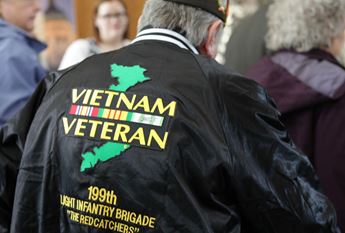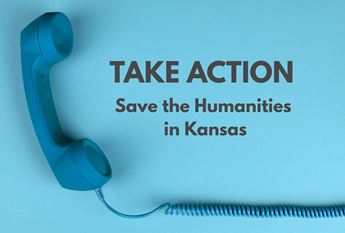

Big Idea: Free Did Not Mean Welcome for My Family
July 6, 2020
By Carmaletta M. Williams, Ph.D.
Millions of African Americans walked away from the South after Emancipation looking for freedom. For some it meant a journey to Kansas, a "free state." Carmaletta Williams writes how her family and many others realized that for Black people in Kansas, "Free" did not necessarily mean "Welcome."
My great-great grandfather, Robert Wilson, packed up his wife Pinkie, his mother-in-law, brother, and uncle, loaded up his wagon, hitched up his mules, and followed the legendary Pap Singleton to Topeka, Kansas. Black folks by the thousands were leaving the South and rural areas and moving North, West, and to cities looking for a new life, a better life, a life in which they could be free to fulfill their Big Ideas of achieving the American Dream. Those migrants who bought into Singleton’s spiel and followed him to Kansas were called the Exodusters. Like the biblical exodus, they were looking for the Promise Land.
The Wilson family believed Ole Pap when he said that Kansas was a land of milk and honey, almost akin to heaven. Tomatoes grew as big as houses. Stalks of corn produced enough ears to keep the family supplied all winter, and beanstalks made ladders mighty enough for Jack to climb. They would grow enough food to take care of the family and have extra provisions left to sell. What Robert Wilson and the other Exodusters discovered was that Pap’s stories were tall tales which laid the crumbling foundation for Wilson’s Big Ideas.
Slavery was behind Robert and his family, so he was determined to move to a land where Black people had the freedom to live unshackled in a free land and take a man’s stand on his own ground. The place that seemed most likely for him to reach these goals was Kansas, a free state. That “free state” status fed right into Wilson’s Big Ideas of what life for Black people should be. They would answer to no one, but themselves. “Yes sir” and “no ma’am” would be spoken out of respect and not obligation. They would dream lofty dreams, have Big Ideas and build a grand successful life on their Free State land. What Pap and everyone else neglected to tell Wilson and the other Exodusters was that for the state of Kansas, “Free Did Not Mean Welcome.”
Those Big Ideas of freedom soon faded. The barracks they moved into in Topeka’s Tennessee Town proved to be an unhealthy place to live. No running water and sanitation issues allowed bacteria to grow unrestricted. Folks were getting sick and dying. People crammed so closely together fostered inhumane living conditions. White Kansans, who by a one vote margin established the state as “free,” did not welcome those Black migrants with open arms and hot meals. There was none of that. Finding himself and his family in a hostile land, Robert Wilson realized that the small amount of money he had been able to save from his work in Kentucky was disappearing fast. If he were to own property, his Big Idea since before Emancipation, he would have to do it soon.
My great-grandfather’s Big Idea of having his family grow together on their own land in a free state would not be realized in Pap Singleton’s distorted dream of Topeka. Instead, he took a chance and bought a farm in Bonner Springs. Like the other hopeful Exodusters, he still held fast to the dream that Black People could find peace and freedom if they just worked hard enough and owned land; however, the political climate would not let that happen. The same Kansans who wanted the state to be “free” did so to keep Black people out. They passed those attitudes on to their children.
"Like the other hopeful Exodusters, he still held fast to the dream that Black People could find peace and freedom if they just worked hard enough and owned land; however, the political climate would not let that happen."
Fear, hard times, and horrific struggles challenged Robert and Pinkie Wilson’s Big Ideas of being welcomed to their new lives, being at peace and harmony with their neighbors of all races, and having the freedom to frame and fulfill their destiny of survival in a Free State. They never gave up their dreams. They lived decent, solid lives on a farm where tomatoes were plentiful, corn grew, and beans sprouted. But the Big Ideas of complete freedom and full agency for Black people did not happen for them, could not have happened for them, in Kansas where Free Did Not Mean Welcome.
Spark a Conversation
Watch the Big Idea Interview with Dr. Carmaletta Williams on July 16, 2020:
Spark a conversation in your community with Carmaletta Williams' Speakers Bureau presentation "Free Did Not Mean Welcome." A full-length presentation is available virtually for Kansas nonprofits and a free mini-presentation is available for individuals via the "Dial-a-Speaker" program. Contact Abigail Kaup for more information.
About Carmaletta Williams
Carmaletta M. Williams is the Executive Director of the Black Archives of Mid-America, Inc. Dr. Williams earned her Masters in English from the University of Missouri-Kansas City and her Doctorate from the University of Kansas. Although she retired from a successful teaching career from Johnson Community College, Dr. Williams still writes and edits for Williams Publishing Group, LLC. She is a published author for both creative writing and scholarly writing, and one of her most remarkable books is titled, Langston Hughes in the Classroom: “Do Nothin’ till You Hear from Me.”




